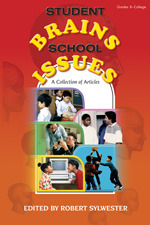Student Brains, School Issues
A Collection of Articles
- Robert Sylwester - University of Oregon, Eugene, USA
Other Titles in:
Brain-Friendly Teaching & Learning | Leadership | Leadership in Educational Technology
Brain-Friendly Teaching & Learning | Leadership | Leadership in Educational Technology
June 1999 | 184 pages | Corwin
Formerly a SkyLight publication.
Student Brains, School Issues: A Collection of Articles is packed with information on how the brain learns, the nature of intelligence, and the vital role that emerging technology plays in how students process information.
We are in the midst of the two most significant revolutions in the history of education: brain research and computer technology. Learn what researchers are discovering about the biological aspects of learning and how this, along with growing technology, is changing the nature of the classroom. This resource, which helps you to understand and incorporate computer technology and the findings from brain research in teaching and learning, focuses on four significant areas:
Student Brains, School Issues: A Collection of Articles is packed with information on how the brain learns, the nature of intelligence, and the vital role that emerging technology plays in how students process information.
We are in the midst of the two most significant revolutions in the history of education: brain research and computer technology. Learn what researchers are discovering about the biological aspects of learning and how this, along with growing technology, is changing the nature of the classroom. This resource, which helps you to understand and incorporate computer technology and the findings from brain research in teaching and learning, focuses on four significant areas:
- The nature of the cognitive science revolution
- The importance of emotion in cognition
- The biological substrate of intelligence
- The relationship between brains and computers in computational thought processes
Introduction
Section 1: Education and the Current Cognitive Science Revolution
Section 2: The Emergence and Importance of Emotion
Section 3: Biological and Technological Perspectives on Intelligence
Section 4: New Perspectives on Computational Thought Processes
Recommended Readings
Authors
Acknowledgments
Index


